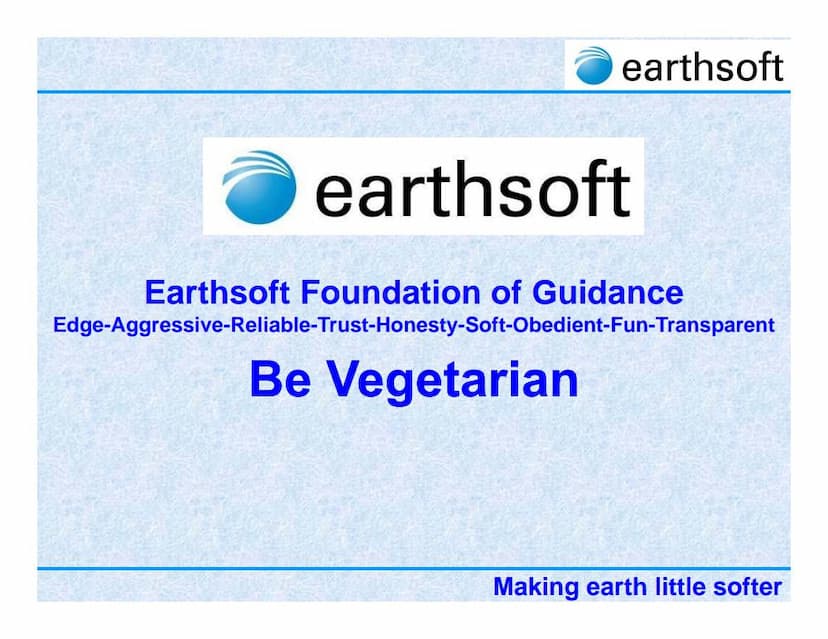Earthsoft Be Vegeterian
Added to library: September 1, 2025

Summary
This document, "Be Vegetarian" by Earthsoft, is a comprehensive guide advocating for vegetarianism. It presents a compelling case for adopting a plant-based diet, highlighting its benefits for personal health, the environment, and ethical considerations.
The book begins with an appeal to circulate the information widely. It then outlines its structure, covering reasons for vegetarianism, how to become vegetarian, dietary guidelines (including a vegetarian pyramid and a healthy vegetarian diet), nutritional information (protein, iron, calcium, B12), the advantages of a vegetarian diet, and potential problems with meat consumption. It also touches upon the environmental impact of meat production and features famous vegetarians and thought-provoking quotes.
Key arguments and information presented include:
- Definition of Vegetarianism: A diet based on plant-based foods, excluding meat, poultry, fish, and products of animal slaughter. It emphasizes that a healthy vegetarian diet can meet nutritional needs at all life stages.
- Reasons to Be Vegetarian: Health, ecological concerns, religious beliefs, dislike of meat, compassion for animals, belief in non-violence, and economic factors.
- Health Benefits: A vegetarian diet promotes good health, long life, improved immunity, better athletic performance, weight control, mental clarity, and a peaceful temperament. It is associated with lower levels of saturated fat and cholesterol, higher intake of fiber, vitamins, and phytochemicals, leading to a reduced risk of heart disease, hypertension, type 2 diabetes, kidney disease, and Alzheimer's.
- Nutritional Guidance: The book provides a "Vegetarian Pyramid" illustrating recommended daily servings of different food groups. It addresses specific nutrients, explaining how to obtain protein, iron, and calcium from plant-based sources. It also discusses Vitamin B12, noting its primary presence in animal products and suggesting alternatives or supplements for vegans.
- Balanced Diet and Nutrient Density: The importance of a balanced diet that meets energy and nutrient requirements is stressed. The concept of "nutrient density" (nutrients per calorie) is introduced, advocating for foods with higher nutrient density.
- Key Nutrients: Carbohydrates for energy and digestive health, proteins for tissue building and metabolism, fats for energy and insulation, water for bodily functions, minerals for bones, fluids, and enzymes, and vitamins for regulating body processes.
- Specific Nutrient Sourcing:
- Protein: Lentils, low-fat dairy, nuts, seeds, beans, whole grains, tofu, and tempeh are highlighted.
- Iron: Enriched bread/cereal, dried fruits, leafy greens, beans, nuts, and tofu are recommended. Vitamin C-rich foods are crucial for iron absorption.
- Calcium: Green leafy vegetables, low-fat dairy, calcium-fortified juices and soy milk, and tofu are good sources. The document highlights that calcium absorption from many green vegetables can be higher than from cow's milk.
- Vitamin B12: Primarily from animal products, with fortified cereals and soya products as vegetarian sources, and supplementation advised for vegans. Vitamin D can be obtained from sunlight and fortified foods.
- Dietary Choices and Influences: Factors influencing food choices include advertising, availability, social pressure, values, habits, and personal preference. The document emphasizes the need for variety, moderation, calorie control, balance, and adequacy.
- Health Impacts of Diet: Chronic diseases are linked to poor diet and lifestyle. A vegetarian diet is presented as a means to prevent high blood pressure, reduce the risk of heart surgery, lower cholesterol, prevent cancers, reduce type 2 diabetes, strengthen immunity, prevent strokes, reduce adult bone loss and dental disease, and increase life expectancy.
- Environmental Impact: The meat industry is identified as a major contributor to greenhouse gas emissions and water consumption. A meat-free diet is shown to significantly reduce fossil fuel usage, pollution, and greenhouse gas emissions. The document uses striking statistics to illustrate the environmental benefits of reducing or eliminating meat consumption.
- Problems with Meat: Saturated fat and cholesterol in animal products are linked to heart disease. High protein intake can stress the liver and kidneys. Meat consumption is also associated with an increased risk of various diseases, including parasitic, bacterial, and viral infections, as well as prion diseases.
- Vegetarian Advantages: Reduced risk of cancer (ovarian, prostate, bladder, colon), less obesity, lower incidence of osteoporosis, significantly reduced risk of heart disease and fatal coronary heart disease, less diabetes, fewer strokes, delayed onset of dementia, and longer life expectancy.
- "Food for Thought" and Famous Vegetarians: The document includes quotes from prominent figures like Paul McCartney and K.D. Lang, and lists Albert Einstein, Isaac Newton, Charles Darwin, and Thomas Edison as famous vegetarians.
- Call to Action: The document concludes with a message about protecting the planet and living in peace, encouraging readers to "Be Veg" and "Go Green."
In essence, "Be Vegetarian" by Earthsoft is a persuasive and informative resource that advocates for vegetarianism by detailing its multifaceted benefits, providing practical nutritional advice, and highlighting the ethical and environmental imperatives for adopting a plant-based lifestyle.